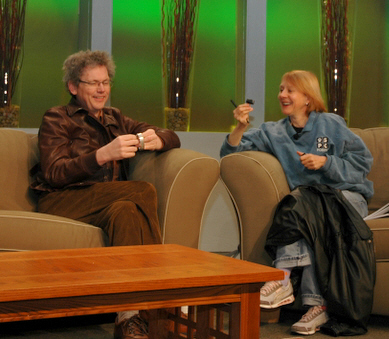Bill Joy: Pandemics, biofuels and the $10 PC

The final day of PC Forum stared with a conversation between Esther and Bill Joy, Sun co-founder and now Kleiner Perkins Caufield Byers venture capitalist.

The discussion touched on how technology, the Internet and politics are impacting society and the planet. As a venture capitalist, Joy and his firm are focused on investing in green technology, semiconductors, life sciences (such as bio-defense), security consumer and other areas. Joy noted that in 1995 at PC Forum he said the personal computer is what's in your pocket. Today he extended that thought, "My goal in 10 to 15 years is to have a $10 device everyone can have." He also believes that access to education and information will be more evenly distributed. "Whether people find the time and have the mentors to use the information and education themselves is another question, but the phenomenon is on the way," Joy said.
Moore's Law continues to play a key role in innovation in various technologies and life sciences. For example, Joy said he invested in a semiconductor company building a mobile chip that integrates memory, logic and wireless functions on single chip. KP is also is investing in biofuels ventures. "It reflects where new materials are driving energy innovation and digital molecular stuff is driving biological science, and computers are making this possible," Joy said. "It's very challenging to separate the coal form the diamond because the breadth of proposals are so wide. Some are 'quacky,' it's hard to tell, and some of the really great stuff sounds like quackery."
Clean water is also on Joy's radar. "Clean water is best way to deliver health....The water problem doesn't admit itself to a single solution--there is no x86 of the water world. The goal is to find the big circles to lay on the problem and overlap them a little bit and use some of the technology to do it. He noted Segway inventor Dean Kamen's efforts to provide power and clean water to rural villages.
KP has a new $200 million fund is to stimulate innovations, pandemic preparedness and global health, focusing on surveillance, detection, diagnostics and vaccines, Joy said. He is optimistic that new technologies and materials will dramatically improve operating costs and performance. "With nanoscale stuff and new materials, we can make 10x improvements in these things," Joy said.
He was asked about the article that appeared in Wired in 2000, titled "Why the future doesn't need us," which contended that technologies such as genetic engineering and nanotechnology, could make humans an endangered species." The problem still exists. I set out to write a book about and concluded the proper response was better public policy and working through international scientific bodies. Constructive action in that sphere hasn't happened fast enough," Joy said. He pointed to the Bush administration as a culprit. "It's frustrating...we reacted to terrorism not very cost effectively, and if we experience a pandemic, it will change our view of the world profoundly."
At the end of the interview, Esther asked Joy, known for his doom and gloom scenarios, for a smile. He willing complied, and said that broad access to information and tools, and a desire to learn, will lead to a lot more people in this century than the last century who will apply their talents to solving the hard problems. Given the flattening of the planet and the continuation of Moore's Law, he's obviously right, and most of the talent will come from outside the U.S.